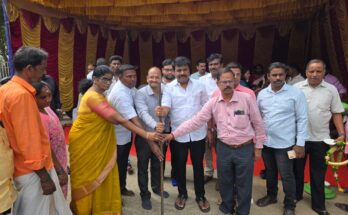India-based organisations launched a website to track climate action of developed countries based on the carbon budget
India-based organisations launched a website to track climate action of developed countries based on the carbon budget
The Climate Change Group at the M.S Swaminathan Research Foundation (MSSRF) Chennai, and the Natural Sciences and Engineering Department at the National Institute of Advanced Studies (NIAS) Bengaluru, have launched a website to track equity in climate action.
The website called the Climate Equity Monitor ( https://climateequitymonitor.in ) is an online data tracker for assessing equity in climate action– in terms of inequalities in energy and resource consumption across the world and climate policies under the United Nations Framework Convention on Climate Change (UNFCCC). The UNF CCC is an international environmental treaty to combat climate change to stabilize greenhouse gas conce ntr ation in the atmosphere.
The Hon’ble Minister for Environment, Forest and Climate Change, Shri Bhupender Yadav welcomed the going live of the website “Climate Equity Monitor” on global climate policy. On the occasion, the Minister said, “I welcome this scientific initiative, Climate Equity Monitor, that focuses on equity and climate action from a data and evidence-based perspective. I hope it will encourage a vigorous discussion on this crucial issue and engage experts from all countries. I congratulate the team that worked on this project and hope that they will continue to improve and enhance it”.
The Climate Equity Monitor will track the performance of developed countries on climate action based on the foundational principles of UNFCCC . The performance and policies of the developing countries will also be provided for comparison.
Experts have long been felt the need of such platform. Such trackers are either based in the Global North (devel oped economies) or funded by them, and they do not adequately address the crucial aspects of equity and diffe rentiation.
The website is the Global South’s independent climate tracker. It will primarily track the latest scientific result of the Intergovernmental Panel on Climate Change (IPCC) report on cumulative emissions and carbon budgets. The IPCC is an intergovernmental body of the United Nations responsible for advancing knowledge on human-ind uced climate change.
The website has been conceptualized and developed by indep en dent researchers from India — the Climate Cha nge Group at the M.S Swaminathan Research Foundation (MSSRF), Chennai, and the Natural Sciences and En gineering department at the National Institute of Advanced Studies (NIAS) Bengaluru, with other inde pen dent researchers. The MSSRF team was led by Prof. T. Jayar aman, Senior Fellow, Climate Change and the NIAS team by Dr. Tejal Kanitkar, Associate Professor.
The foundational principles of UNFCCC acknowledge equity in the climate action. The principle of Common but Differentiated Responsibilities and Respective Capabilities (CBDR–RC) is enshrined in the 1992 UNFCCC treaty, which was ratified by all participating countries. This means that though it is the common responsibility of all na tions to protect the global climate. However, there is a need to take into account the different circumstances of nations, particularly each nation’s contribution to the climate change problem and their ability to mitigate and adapt to it.
As climate change results from the cumulative emissions of CO2 and other greenhouse gases. Limiting global temperature increase to a specific level means limiting cumulative CO2 emissions to within a carbon budget.
The equitable sharing of the global carbon budget is therefore the fundamental equity principle that will underpin the assessments presented on the website.
The website is expected to be a valuable tool for policy makers, public institutions, researchers, academics, st udents, and the general public from developing countries to keep equity and climate justice considerations clearly in view in their perspective.
For more updates, do follow us on social media:
Twitter: @Equity4climate





